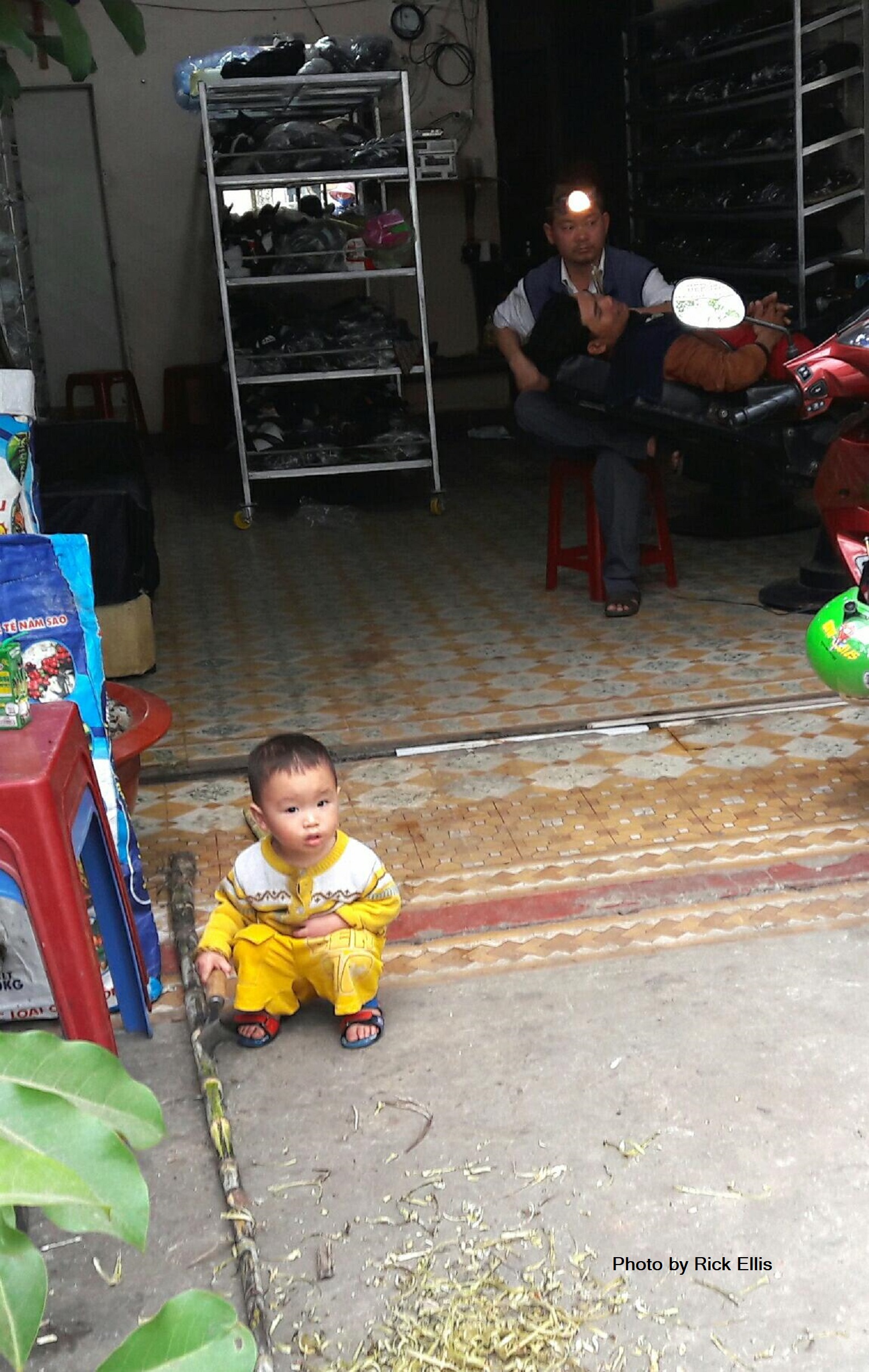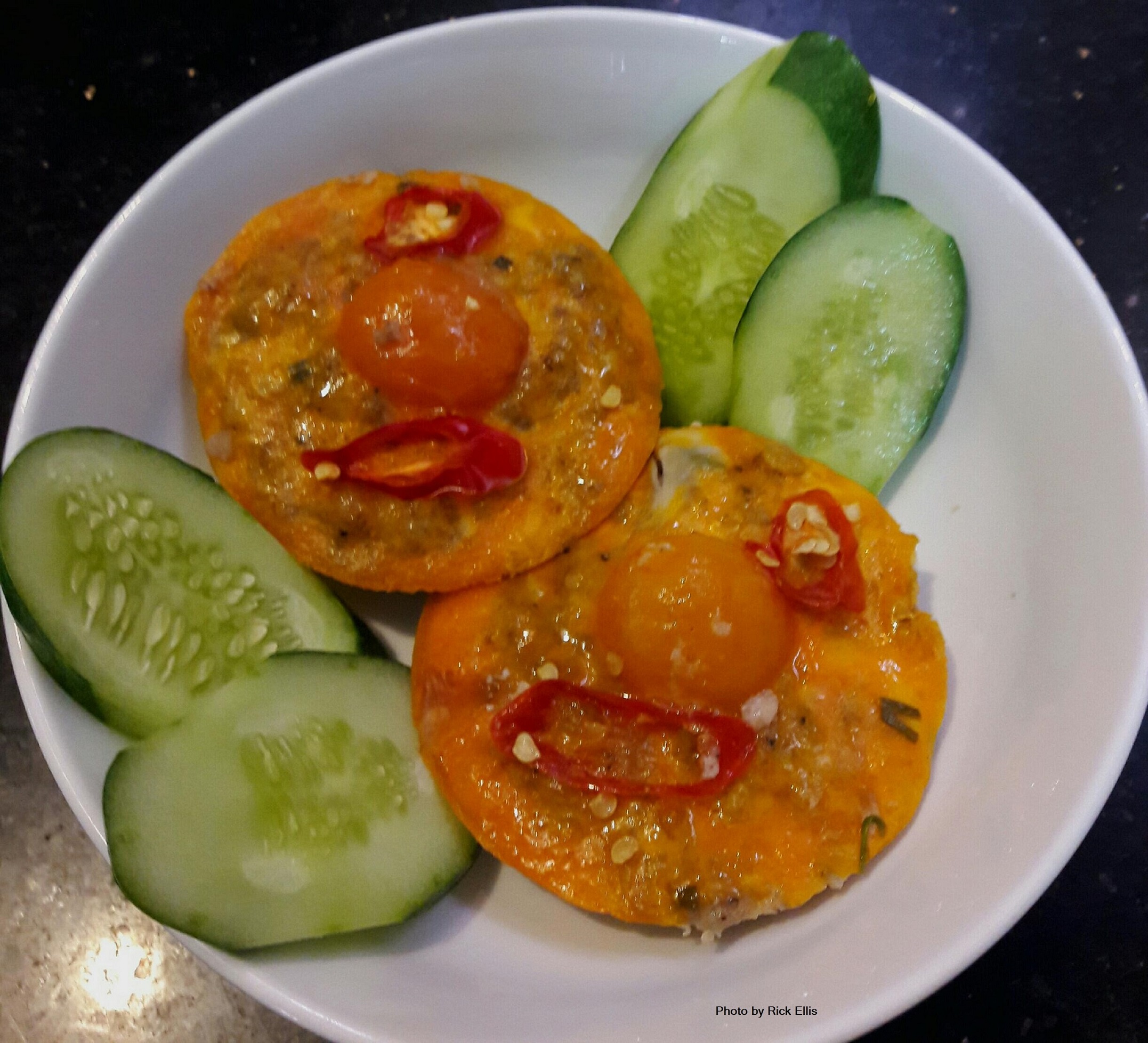In true Asian spirit, there is a degree of ambiguity – ‘barbershop’ is somewhat of a misnomer because several businesses reside under the same roof, although all the signs indicate that the sole business is hair care.
The barbering section of the shop is certainly the focal point of the enterprise, consisting of two creaky old leather chairs, a sagging, lumpy sofa, various creams, old shaving brushes with bristles like drooping willows, gels, plus tools and implements from days long gone by.
Then the waters become a little murky.
There are racks of shoes and sandals occupying a fair chunk of floor space, overseen by the lady of the house. On top of that, there’s a stack of sugarcane stalks stored vertically against the wall in the corner so thirsty customers can knock back a nuoc mia (sugarcane drink — one of nature’s best remedies for dehydration).
If all that wasn’t enough, there is a tiny display stand advertising scratch-off phone cards for sale, but none are visible, so perhaps that revenue stream is now obsolete due to an abundance of competition in the neighbourhood.
Practically every third business in the entire country sells them, so even if all 97 million inhabitants of Vietnam rushed out to buy one every few days, the market would still be grossly saturated.
There’s a portable machine with a silver wheel installed on the back similar to those employed to steer ships. When the wheel is turned with gusto it squishes the sugar cane, reminiscent of a wringer on an old-style washing machine, thus extracting those heavenly juices.
Standard procedure is to squish each stick precisely three times to get all the juice out, which is drained into a vessel resembling a steel pan used by mechanics for draining automobile oil.
|
|
| Cutest sugarcane peeler in history |
The sugarcane operation has been shunted to the side of the entrance (taking a back seat for winter?), leaving a clear path so people can actually enter and leave the shop without hopscotching over motorbikes, kids, toys, piles of sandals headed for stock, sugarcane shavings, half-empty bowls of food, piles of hair from the field of battle inside, and other forgotten things strewn about.
Years ago, mixing business and personal life in such a manner irritated my narrow little Western mind, where black is black and white is white. ‘Business is business’ and ‘maintain a professional image’ come to mind.
Not in this part of the woods.
The business, obviously, is on the ground floor in the typical Asian shophouse layout, with living quarters above, so that work and family life are blended together and muddled, yet somehow balanced and synchronized.
Customers are shopping, dad is chopping, hacking, and scraping hair and beards, mom zipping around in ten different directions, kids playing, grandparents hovering — and it’s never still for even a moment.
One could argue that there is a solid business strategy behind having the three (four?) disparate business ventures under one roof. It’s feasible — although a bit of a stretch — that a thirsty customer arrives, pounds a nuoc mia, gets a trim, buys a pair of shoes, and tops up the phone.
The exchange would go something like this: “Shave and a haircut, a glass of sugarcane juice, one VND50,000 phone card, and, while we’re at it, a new pair of thongs. And don’t forget to yank the hairs out of my nose, they’re driving me nuts.”
While waiting, I decided to do a status check on the latest news and fan mail, but had no Internet connection. I did spot an available network named after the rice joint next door, just needed access. Fortunately, there are a limited number of Wi-Fi passwords currently in circulation in Vietnam, so it’s not hard to hack into most networks.
The unofficial National Wi-Fi Password of Vietnam is — you guessed it — ‘123456789,’ but if it doesn’t work for you, try ‘12345678,’ that old favourite ‘88888888,’ then finally the marginally more creative ‘87654321.’
I swear one of those will get you into 90 percent of the local small business networks in the country, and if not, just ask, the staff will probably give you the password anyway even if you’re not a customer.
Not only is the Internet a social and business tool, it’s also considered a cornerstone of the educational process, an indispensable tool in a country rushing to develop, not to mention all those damned games that keep kids quiet in waiting rooms and cafés.
It goes without saying that the rural parts of Vietnam don’t have anywhere near the bandwidth they need, never mind the money to pay for it, but in any built-up area affordable web access at a decent speed is a given.
The differences in cultural values around Southeast Asia are reflected in the availability and ease of use of free Wi-Fi. Every password I’ve ever received in Singapore, as one example, is something like ‘&I-d4#@^Ul9&%Y>?L**/#+ABC#>^,’ which would take a team of space scientists years to crack.
No doubt customers muff up the input of such a ridiculous string of characters, finally abandoning the cause altogether, which is precisely what the business hopes for.
In the Philippines, free Wi-Fi is advertised, but it often doesn’t work, even in the pricey international cafés, and staff are overly protective of passwords, which are furtively passed to customers on teeny-weeny slips of paper using a microscopic font which most can’t read (of which the staff are well aware).
I learned the hard way to ask for the password before ordering anything, which irritated service people, but after often being stuck with a US$3.50 coffee and no Wi-Fi, best to get it up front and risk ruffling some feathers.
Within moments I hacked into the rice joint’s Wi-Fi guilt-free since I’m a regular customer, thanks to my addiction to their ‘mam chung’ (ground pork/fish meatloaf with egg and fish sauce).
|
|
| Epic mam chung meatloaf |
I forged ahead checking current events and reader updates, which ranged from:
“Your articles suck,” to
“I always eagerly await your installments,” and, the instant classic which shall forever be remembered, coined in this Year of Hell 2020:
“My visa extension is about to run out. What should I do?”
The barber continued hacking away on those heads without changing expression or rhythm. Clearly a serious professional — just the kind you’d let loose near your jugular with a straight razor.
The lady of the house buzzed around in the background sporting her cotton pyjamas, offering encouragement, serving shoe customers, ferrying in endless bowls of food, wiping mouths and noses, and otherwise running after their tots, an exhausting duty akin to herding cats.
Those pyjamas are a uniform, symbolizing her status as a busy homemaker, and she truly is constantly on the go, but she’s stoked, everything she wants is right under her nose, within her grasp. I’ve never seen the woman venture more than a few shops in either direction, so she has little need for fancy attire.
The ladies’ pyjama situation in Vietnam is more complex than it may appear to the untrained eye. In Europe, people dress to the nines just to go out for a cup of coffee or fetch a baguette, but not around here.
Practicality rules in Vietnam.
True, some ladies are often seen in more sophisticated pyjama-like garb, usually silk, but those ensembles fall more into the category of leisure suits, so access to decent restaurants, banks, shops, and such is stretching it a bit, but still within the realm of acceptability.
So, over the years the pendulum has swung wildly from one extreme to the other with me hanging on for dear life, from a glitzy hair salon in a developed country to this cocktail of small business ventures run by a master of the trim and scrape, and his pyjama-clad, sandal-flogging, kid-herding wife.
Every customer that ventures inside becomes a part of all that’s going on, entwined in the action, and could easily end up with a kid on his lap while balancing a bowl of rice.
That shophouse may not be the bomb esthetically-speaking, but it’s real and spontaneous, unscripted and original, bursting at the seams with life.
Like us on Facebook or follow us on Twitter to get the latest news about Vietnam!






